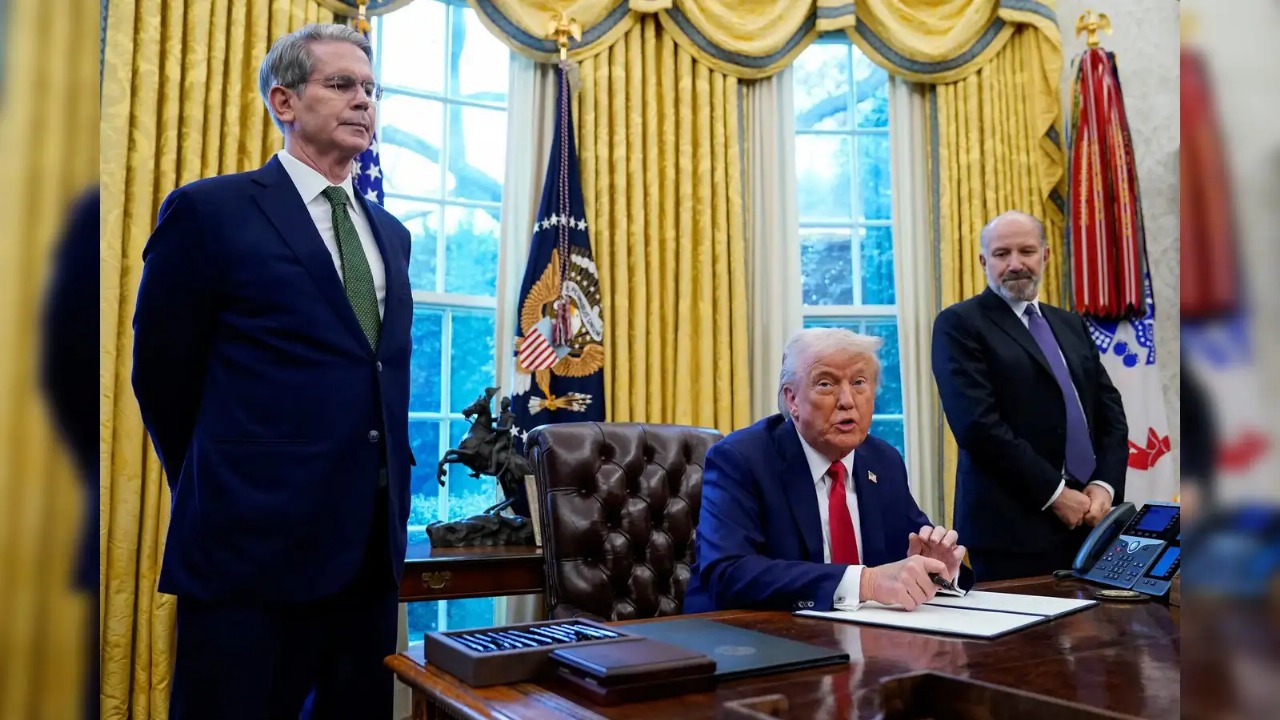 Image Source: The Economic Times
Image Source: The Economic Times
In a series of pointed remarks that signal the direction of U.S. economic policy, Treasury Secretary Scott Bessent laid out a multi-pronged strategy aimed at stimulating housing, reducing national debt, and tightening trade discipline. Speaking in the wake of fresh inflation data and rising expectations of a Federal Reserve rate cut, Bessent emphasized the need for aggressive monetary easing, a recalibration of tariff revenues, and a firm stance on global energy arbitrage. His comments come as markets brace for a potential 50-basis-point rate cut in September and as geopolitical tensions continue to shape trade dynamics.
Rate Cuts As A Catalyst For Housing And Affordability
Bessent reiterated his call for a jumbo rate cut, arguing that lower borrowing costs could unlock the U.S. housing market and ease price pressures over the next two years:
- A 50-basis-point cut in September is now seen as increasingly likely, with market odds nearing 96 percent
- Bessent believes rate cuts will spur homebuilding activity, which in turn will stabilize housing prices by 2026
- Mortgage rates remain elevated near 7.5 percent, nearly double their pandemic-era lows
- Treasury yields have begun to ease, reflecting growing confidence in a Fed pivot
- The administration estimates that each 25-basis-point cut could generate 50,000 additional home sales annually
His remarks align with broader concerns about housing affordability and construction financing, which have constrained supply despite strong demographic demand.
Tariff Revenue To Tackle Debt And Deficit
In a notable shift toward fiscal consolidation, Bessent announced plans to use rising tariff revenues to reduce the U.S. debt burden and narrow the deficit-to-GDP ratio:
- Tariff collections are projected to be revised upward from $300 billion this year to a substantially higher figure
- These funds will be earmarked for debt repayment and deficit reduction, rather than discretionary spending
- The move is part of a broader strategy to restore fiscal discipline without compromising growth
- Bessent emphasized that tariff income should serve national priorities, especially amid rising interest payments on federal debt
This approach reflects a balancing act between trade protectionism and fiscal responsibility, with tariffs now positioned as a revenue tool rather than purely a geopolitical lever.
A Stern Message On Oil Arbitrage
Bessent also addressed energy trade practices, specifically criticizing India’s role in arbitraging Russian oil:
- He called India’s resale of discounted Russian crude to global markets unacceptable
- The practice, he argued, undermines sanctions and distorts global energy pricing
- Bessent’s comments signal potential diplomatic friction, especially as India continues to benefit from discounted Russian oil amid Western restrictions
- The U.S. may consider policy responses or trade recalibrations if the practice persists
His remarks underscore the complexity of enforcing sanctions in a multipolar energy landscape, where economic interests often clash with strategic alignments.
Market Reaction And Policy Implications
Bessent’s statements have already begun to influence market sentiment and policy expectations:
- Ten-year Treasury yields dipped slightly, reflecting anticipation of rate cuts
- Equity markets responded positively to the housing stimulus outlook
- Analysts expect further clarity on tariff revisions in the upcoming fiscal update
- The housing sector, particularly homebuilders and mortgage lenders, is watching closely for Fed action in September
Meanwhile, trade analysts are assessing the potential fallout from Bessent’s oil comments, especially in the context of U.S.–India relations and broader energy diplomacy.
Conclusion: A Vision Of Stimulus With Strings Attached
Scott Bessent’s latest policy outline blends monetary stimulus with fiscal prudence and trade discipline. His push for rate cuts aims to revive housing and affordability, while tariff revenues are being redirected toward debt reduction. At the same time, his firm stance on energy arbitrage signals a tougher line on global trade ethics. As the U.S. navigates inflation, housing shortages, and geopolitical tensions, Bessent’s blueprint offers a glimpse into the administration’s evolving economic playbook.
Sources: Mortgage Professional America, Roic News, U.S. News & World Report
Advertisement
Advertisement




